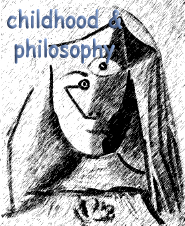philosophy and children: for or with?
DOI:
https://doi.org/10.12957/childphilo.2020.51240Keywords:
philosophy, education, childhood, p4c, pwc.Abstract
In this paper, two different philosophical proposals to introduce and carry out philosophy in school spaces which include the participation of children are compared, these are: Philosophy for Children (P4C), mainly developed by Matthew Lipman and Ann Sharp, and Philosophy with Children (PwC), which is actually a set of “second generation” (counter)proposals –as described by Vansieleghem and Kennedy (2011), based on Reed and Johnson (1999)–, among which those created by Walter Kohan and Karin Murris, to mention a few, stand out. The text begins with some similarities between both proposals, before comparing them in each of their dimensions. First, P4C is discussed. Second, PwC. Their ideas about education, school, philosophical education, their concept of childhood, the role given to teachers and their relation with politics are the main focus. Third, PwC’s critique of the P4C programme is studied. Finally, the paper concludes with some ideas on the issue of introducing philosophy to the school space. Particularly, PwC’s proposal is supported, fundamentally because of its coherent acknowledgment of the autonomy of teachers and of the political element in education, since philosophical experience with children is particularly questioning, defying, and, therefore, it has the possibility of bringing about important transformations, both at a personal-individual level, as well as a collective one.
Downloads
References
Cavell, S. (1979). The Claim of Reason. Oxford. Oxford University Press.
Biesta, G. (2017). Touching the Soul? Exploring an Alternative Outlook for Philosophical Work with Children and Young People. Childhood & Philosophy 13(28), 415-452.
Dewey, J. (1938). Logic. The theory of inquiry. Nueva York. Henry Holt and Company.
Haynes, J. y Murris, K. (2011). The Provocation of an Epistemological Shift in Teacher Education through Philosophy with Children. Journal of Philosophy of Education 45(2), 285-303.
Kennedy, D. (2006). The Well of Being: Childhood, Subjectivity and Education. Nueva York. State University Of New York Press.
Kohan, W. (2004). Infancia. Entre educación y filosofía. Barcelona. Laertes.
Kohan, W. (2009). Infancia y filosofía. México D.F. Progreso.
Kohan, W. (2010). Filosofía y educación. Caracas. Fundación para la cultura y las artes.
Kohan, W. (2016a). El maestro inventor: Simón Rodríguez. Caracas. Ediciones del Solar.
Kohan, W. (2016b). Viajar para vivir: ensayar. Buenos Aires. Miño y Dávila.
Kohan, W. (2020). Paulo Freire más que nunca: una biografía filosófica. Buenos Aires. CLACSO.
Kohan, W. y Costa, M. (2019). Finding Treasures: Is the Community of Philosophical Inquiry a Methodology?. Studies in Philosophy and Education 38, 275–289.
Kohan, W. y Olarieta, B. (Comps.) (2013). La escuela pública apuesta al pensamiento. Rosario. Homo Sapiens.
Kohan, W. y Waksman, V. (1999). Filosofía con niños. Buenos Aires. Novedades educativas.
Lago, J. C. (2006). Redescribiendo la comunidad de investigación. Madrid. Ediciones de la Torre.
Lipman, M. (2003). Thinking in Education. Cambridge. Cambridge University Press.
Lipman, M. (2004). Natasha: aprender a pensar con Vygotsky. Barcelona. Gedisa.
Lipman, M. (2008). Philosophy for Children’s Debt to Dewey. In Pragmatism, Education and Children. International Philosophical Perspectives, en: Taylor, Michael, Schreier, Helmut, y Paulo Ghiraldelli (eds.). Pragmatism, Education, and Children: International Philosophical Perspectives (pp. 143-152), Amsterdam/New York: Rodopi.
Lipman, M. (2016). El lugar del pensamiento en la educación. Barcelona. Octaedro.
Lipman, M., Sharp A., y Oscanyan, F. (1992). La filosofía en el aula. Madrid. Ediciones de la Torre.
Masschelein, J. y Simons, M. (2014). Defensa de la escuela. Buenos Aires. Miño y Dávila.
Matthews, G. (2014). El niño y la filosofía. México D.F. Fondo de Cultura Económica.
Murris, K. (2008). Philosophy with Children, the Stingray and the Educative Value of Disequilibrium. Journal of Philosophy of Education 42 (3-4), 667-685.
Murris, K. (2013). The Epistemic Challenge of Hearing Child’s Voice. Studies in Philosophy and Education 32, 245-259
Murris, K. (2016). The Philosophy for Children Curriculum: Resisting “Teacher Proof” Texts and the Formation of the Ideal Philosopher Child. Studies in Philosophy and Education 35(1), 63-78.
Murris, K. (2018). Philosophy with Picturebooks. En M. Peters (Ed). Encyclopedia of Educational Philosophy (pp. 1877-1883). Singapur. Springer.
Murris, K. (2019). Children’s Development, Capability Approaches and Postdevelopmental Child: The Birth to the Fourth Curriculum in South Africa. Global Studies of Childhood 9(1), 56–71.
Piaget, J. (1951). The Child’s Conception of the World. Londres. Routledge.
Reed, Ronald F. y Johnson T. W. (1999). Friendship and Moral Education. Twin Pillars of Philosophy for Children. Nueva York. Peter Lang.
Sánchez-Manjavacas, J. (2020). Hacia la escucha con/entre la infancia. La posibilidad de entender el filosofar desde la filosofía con niños (FCN) (Entrevista a Walter Kohan). Pensar Juntos. Revista Iberoamericana de filosofía para niños 4, 109-126.
Santiago, G. (2006). Filosofía, niños, escuela. Buenos Aires. Paidós.
Shapiro, C. (2019). El lugar de la deliberación en la filosofía para niños de Lipman. Childhood & Philosophy 15, 01-18.
Sharp, A. y Splitter, L. (1995). La otra educación. Buenos Aires. Manantial.
Skliar, C. (2017). Pedagogía de las diferencias. Buenos Aires. Noveduc.
Trombadori, D. (2010). Conversaciones con Foucault. Buenos Aires. Amorrortu Editores.
Vansieleghem, N. (2005). Philosophy for Children as the Wind of Thinking. Journal of Philosophy of Education 39(1), 19-35.
Vansieleghem, N. y Kennedy, D. (2011). What is Philosophy for Children, What is Philosophy with Children—After Matthew Lipman?. Journal of Philosophy of Education, 45 (2), 171-182.
Wozniak, J. (2013). Ejercicios para tornar el mundo extraño. En W. Kohan, y B. Olarieta (comps.). La escuela pública apuesta al pensamiento (pp. 117-140). Rosario. Homo Sapiens.




